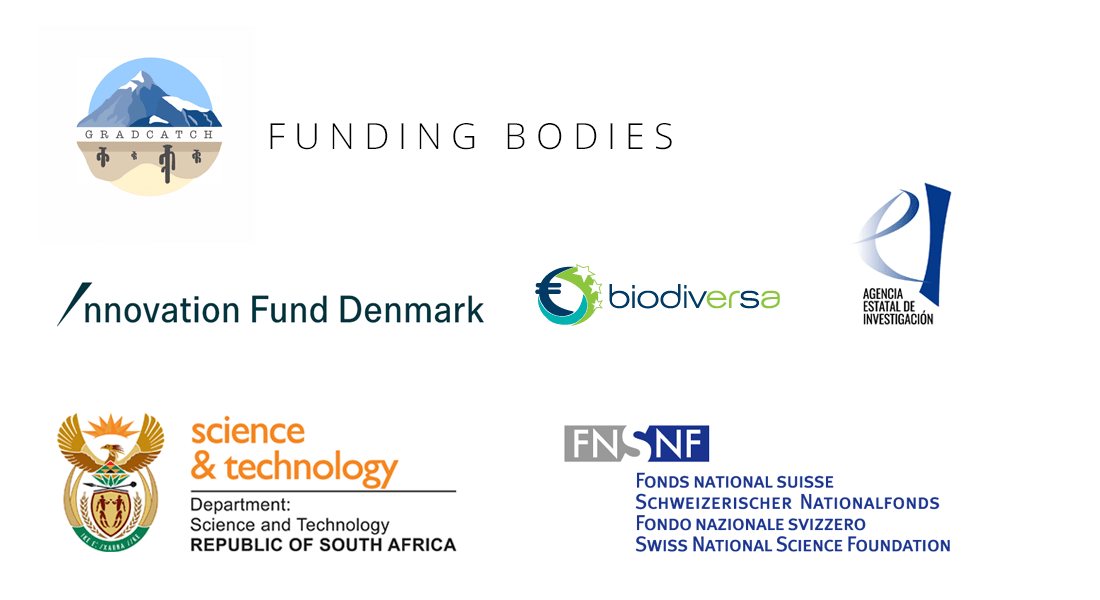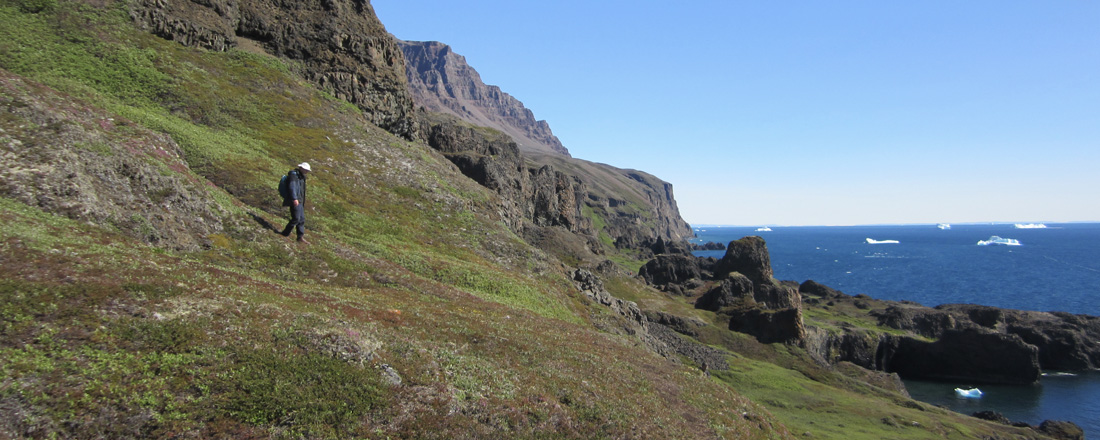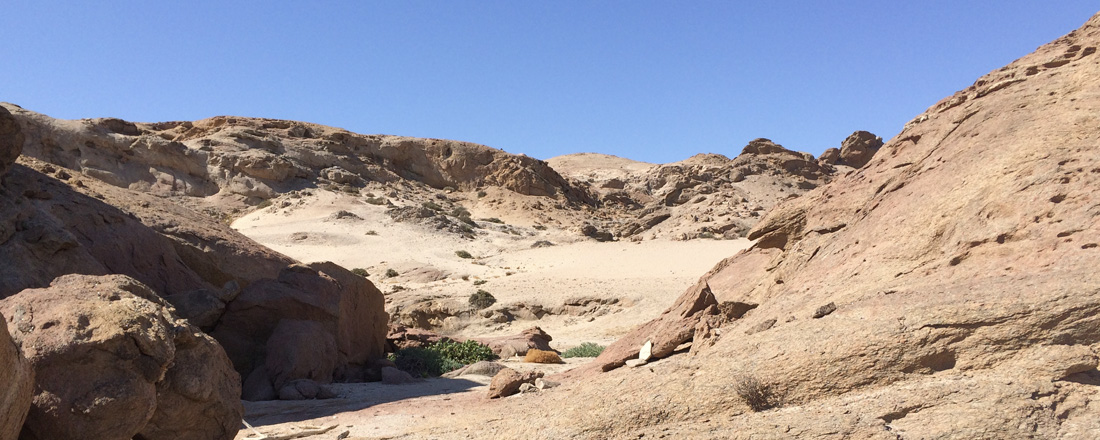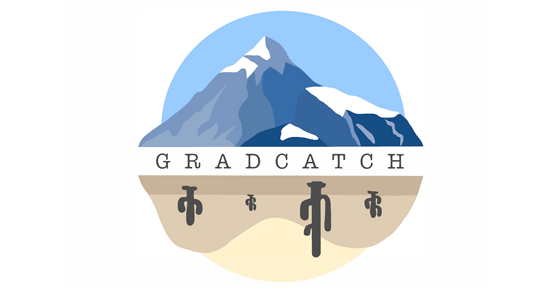GRADCATCH - Using natural environmental GRADients to decipher the adaptation of soil microbial Communities to climATe CHange
Climate change has large effects on most biomes on Earth. This includes effects on soil microorganisms and their activity, which in turn may affect the release of greenhouse gases and the turnover of nutrients important to plants. Despite their importance, these effects are poorly understood by the scientific community. The overall aim of GRADCATCH is to unravel the effects of climate change at regional and global scales on soil microorganisms and their feedbacks on climate. To accomplish this, GRADCATCH will study trans-continental natural gradients in aridity, latitude and altitude.
GRADCATCH - Using natural environmental GRADients to decipher the adaptation of soil microbial Communities to climATe CHange
Climate change has large effects on most biomes on Earth. This includes effects on soil microorganisms and their activity, which in turn may affect the release of greenhouse gases and the turnover of nutrients important to plants. Despite their importance, these effects are poorly understood by the scientific community. The overall aim of GRADCATCH is to unravel the effects of climate change at regional and global scales on soil microorganisms and their feedbacks on climate. To accomplish this, GRADCATCH will study trans-continental natural gradients in aridity, latitude and altitude.
The main objectives of GRADCATCH are to:
- understand short- and long-term adaptation and susceptibility of soil microbial diversity and functions to climate change, such as variations in soil water availability and temperature,
- identify phylogenetic and functional soil microbial indicators of climate change, and
- generate robust data for modelling of climate-soil biodiversity feedback processes, mainly production and consumption of the greenhouse gases CO2, CH4 and N2O.
GRADCATCH will assess how soil microbial abundance, diversity, activity and functions change along four natural gradients, i) a trans-continental latitudinal gradient from the extreme high Arctic in North Greenland through low Arctic to boreal and temperate Europe, ii) an altitudinal gradient in the Swiss Alps, and iii) two aridity gradients, one from the humid NW to the arid SE Spain and one from humid to arid biomes in South Africa. This encompasses sampling 70 field sites. In addition, we will perform in situ soil transplantation experiments along the four gradients and in silico laboratory experiments on soil microcosms to investigate the short-term (one year) effects of predicted climate change.
In the field, we will measure the fluxes of CO2, CH4 and N2O. In the laboratory, we will employ DNA- and RNA-based methods as well as assays of enzyme activity to investigate how soil microbial diversity and activity link to predicted climate change scenarios. In addition, we will use our data to parameterise computer models of microbial functioning and response to climate change.
We expect that the data generated by GRADCATCH will have an impact beyond the scientific community. Thus, we will engage a number of stakeholders in the planning of our experiments and in the interpretation of the data generated. We hope that the involvement of stakeholders from local communities, NGOs, government departments and policy makers will enhance knowledge transfer and that the data generated will improve regulations in order to mitigate the effects of climate change.
GRADCATCH is a collaboration between University of Copenhagen, Denmark; University of Girona, Spain; Swiss Federal Institute for Forest, Snow and Landscape Research WSL, Switzerland; University of Pretoria, South Africa; and University of California, Irvine, US.
GRADCATCH is funded by the BiodivClim COFUND Action BiodivERsA supporting research on “Biodiversity and climate change”. Thus, GRADCATCH is co-funded by the European Commission and four national funding agencies: Innovationsfonden (DK), xx (ES), xx (CH), and xx (SA).
The GRADCATCH project investigated the short- and long-term effects of climate on soil microorganisms across six major climate gradients. This included three temperature gradients (from N to S Greenland, from N to S Europe, and from mountain top to valley in the Alps) and three aridity gradients (from moist N Spain to dry SE Spain and two gradients in South Africa from moist mountains to hot deserts).
GRADCATCH made significant strides in understanding the links between soil microbial diversity and key ecosystems functions performed by microorganisms, such as nutrient cycling and emission of greenhouse gases. GRADCATCH showed how soil microbial communities respond to climate change, with several key findings that have important implications for science and environmental management.
Across the European gradient, we demonstrated the importance of fungal diversity in sustaining functionality related to soil carbon, nitrogen and phosphorous cycling. This highlights the importance of fungal diversity in maintaining soil health and regulating ecosystem functions, particularly in temperate forests.
The Alpine elevational gradient revealed how soil organic matter influences microbial activity and greenhouse gas emissions in mountains.
In Spain, we found that increasing aridity changes microbial community structures, but key soil functions remained stable due to functional redundancy, i.e. different soil microorganisms perform similar functions in different environments across the strong gradient from moist forests to drylands. This means that even if some microbes are lost due to increased aridity, others can take over their roles, helping to maintain soil health.
In contrast to the Spanish soils, microbial activity in a Greenlandic soil peaked at moderate drought levels but declined sharply under severe drought, indicating a tipping point in drought response. Also, High Arctic soils from North Greenland showed lower resistance compared to southern soils indicating higher sensitivity to drought events. Across the Greenlandic gradient, soil organic matter content was found to be crucial for microbial activity during droughts.
A marker gene-based workflow developed during GRADCATCH allowed us to link soil bacterial traits to environmental factors, showing how changes in climate and vegetation affect bacterial communities. This novel approach can complement metagenomic studies and improve trait-based biogeochemical models, leading to better predictions of e.g. how ecosystems will respond to climate change.
Overall, GRADCATCH provided valuable insights into the complex interactions between climate, soil properties, and microbial communities. These findings are crucial for predicting ecosystem responses to climate change and guiding soil management practices to maintain healthy and productive soils.
- Donhauser, Doménech-Pascual, Han X., Jordaan K., Ramond J.-B., Frossard A., Romaní A.M., and Priemé A. (2024) Modelling soil prokaryotic traits across environments with the trait sequence database ampliconTraits and the R package MicEnvMod. Biological Informatics 83, article 102817. https://doi.org/10.1016/j.ecoinf.2024.102817
- Han, X., Beck. K., Bürgmann H., Frey, B., Stierli, B., Frossard, A. (2023). Synthetic oligonucleotides as quantitative PCR standards for quantifying microbial genes. Frontiers in Microbiology 14:1279041. https://doi.org/10.3389/fmicb.2023.1279041
- Han X., Doménech-Pascual A., Casas-Ruiz J.P., Donhauser J., Jordaan K., Ramond J.-B., Priemé A., Romaní A.M., and Frossard A. (2024) Soil organic matter properties drive microbial enzyme activity and greenhouse gas fluxes along an elevational Geoderma, 449, article 116993. https://doi.org/10.1016/j.geoderma.2024.116993
- Doménech-Pascual Rodriguez L.C., Han X., Casas-Ruiz J.P., Ferriol-Ciurana J., Donhauser J., Jordaan K., Allison S.D., Frossard A., Priemé A., Ramond J.B., and Romaní A.M. Soil functions are shaped by aridity through soil properties and the microbial community structure. Accepted for publication in Applied Soil Ecology, APSOIL-D-25-00261R1.
 Coordinator CoordinatorProfessor Anders Priemé |
|
 Partner PartnerResearch Scientist Aline Frossard |
|
 Partner PartnerProfessor Anna M. Rómani |
|
 Partner PartnerAssistant Professor Jean-Baptiste Ramond |
|
 Sub-contractor Sub-contractorProfessor Steven Allison |
|
Staff
| Name | Title |
|---|---|
| Aline Frossard | Tenure-track research scientist |
| Anders Priemé | Professor |
| Anna Doménech | Laboratory assistant |
| Anna M. Rómani | Professor |
| Han Xingguo | Post doc |
| Jean-Baptiste Ramond | Assistant professor |
| Joan Pere Casas-Ruiz | Post doc |
| Luis Bañeras Vives | Associate professor |
| Steven Allison | Professor |






